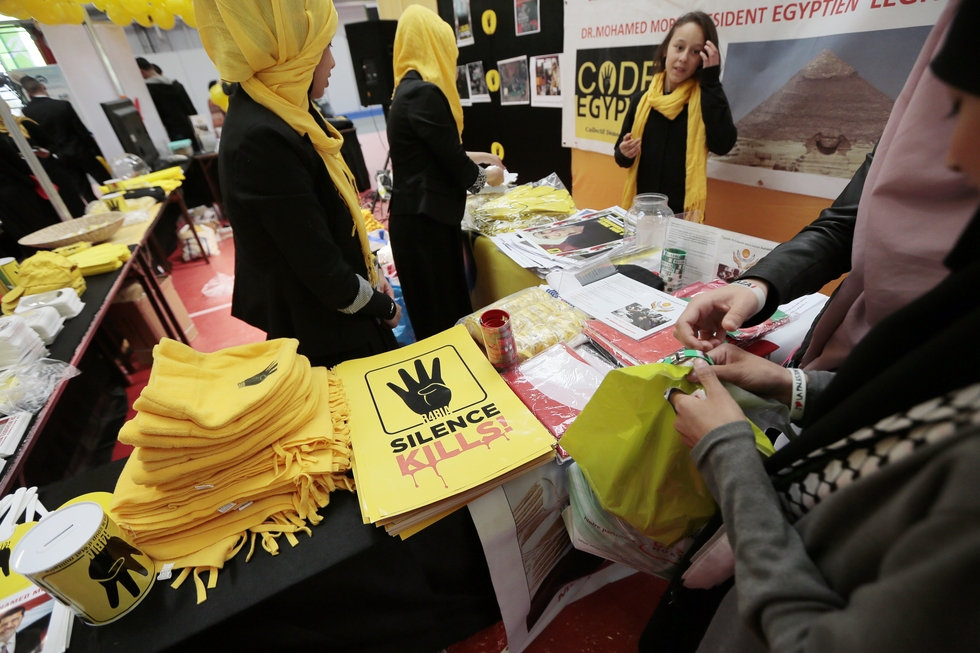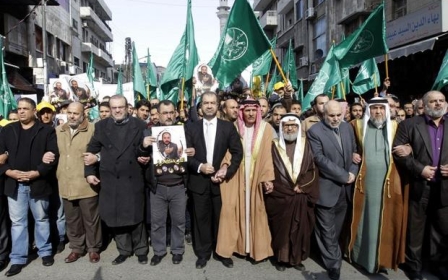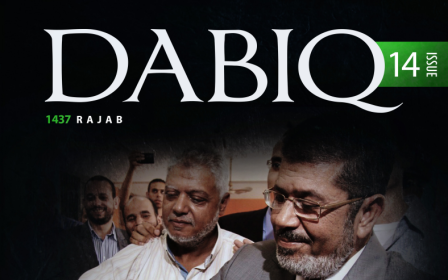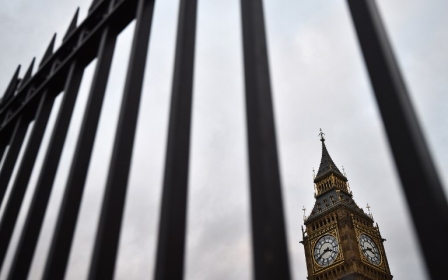It's open season on the Muslim Brotherhood

Last week the Islamic State (IS) devoted 25 pages of its propaganda magazine Dabiq to a “feature” denouncing the Muslim Brotherhood as apostate. “Over the last few decades, a devastating cancer has emerged, mutated, and spread, attempting to drown the entire Ummah [Muslim community] in apostasy,” IS said, describing the Brotherhood’s religion as a combination of various tenets and rites of democracy, liberalism, pacifism and socialism “borrowed from the pagans of West and East”.
IS’s attack on the “Murtadd Brotherhood” rested on two counts: Meeting “tyrants” such as the Iranian supreme leader and maintaining a relationship with Shia nations through Hamas is one. The second one was more interesting. It was that the Brotherhood was guilty of the sin of democracy. This, it defines, as a “religion that gives supreme authority to people rather than Allah”.
“In it, the right to legislate is distributed amongst mankind so that they thereby determine what laws are fit to be ruled by in the lands,” declares Dabiq, alluding to democracy. “If the majority decide sodomy is legal, it is legalised even though it contradicts Allah’s Sharīah.”
On the same day as Dabiq appeared, Jordan announced it was closing down the Brotherhood headquarters in Amman and six other offices and banning it from holding internal elections.
Open season has been declared on the Brotherhood. Whether the hunters are Salafi jihadists, the King of Jordan or the president of Egypt, or indeed David Cameron, the British prime minister, the effect of their labours is the same. About one third of the Arab electorate would vote for political Islamist candidates in free elections so this is about disenfranchising the biggest political movement in the region.
The pretext for the crackdown in Jordan is the existence of a licensed offshoot called the Muslim Brotherhood Society, although the bulk of its members still lies with the old party.
Rather than do anything as messy as shoot 3,000 protesters dead in the streets of Cairo and Alexandria or fill up the country’s jails with over 40,000 political prisoners, Jordan is squeezing the life out of the Brotherhood by fragmenting it.
This is a bold move as the Brotherhood is the largest political movement in Jordan. It is also as old as the modern state is. The government is nullifying a legal status dating back to a cabinet decision made in 1946.
The satellite TV station Al-Yarmouk, which is close to the Brotherhood, expects to stop transmitting from Amman and will move abroad. The extinction of the Brotherhood in Jordan is performed by seals of red wax poured into keyholes, rather than bullets, but the effect for now is still just as real.
Jordan’s moves against the rump of the movement have divided observers. Some see splits within the Brotherhood as an internal issue and say that government moves have the sole purpose of persuading the Brotherhood to participate in legislative elections to be held early next year.
Others note the cumulative effect of Jordan’s rigged elections on the Brotherhood. It won only six seats in 2007 parliamentary elections out of a total of 110, which at the time was seen at blatant political fraud. Candidates who knew they had won seats by observing the count woke up the next day to find they had not.
Muhammad Abu Rumman wrote before the November 2010 elections: “The push to boycott this year ironically came from those who are called the doves or moderate reformists, who had pushed for participation in 2007 (despite fraud in municipal elections the same year) and felt burned by the results. In addition, Brotherhood leaders were disappointed with the new electoral law passed earlier this year, which they saw as unbalanced and favouring tribal allegiances rather than political parties.”
The same pattern is being repeated now. Each time the Brotherhood plays along with the elections game in Jordan it ends up as window dressing. This is not to say that the movement isn’t being torn apart by rifts between hawks and doves about the boycott issue.
Hassan Abu Haniyeh, an authority on Islamists in Jordan wrote: “Engaging in political action within a semi authoritarian political environment immersed the Muslim Brotherhood group in a state of anxiety, internal tension, division and strife. The regime’s policies demand more political participation from it and no boycott. However, it does not guarantee the observance of fair measures in attaining democratic results. Hence the dispute among the radicals and the moderates over the viability of the political process and the limits of moderation and radicalism.”
There may be another motive. Jordan has often acted as His Master’s Voice - only the master this time might have changed. Jordan’s moves against its Brotherhood are closely tied to its security relationship with the United Arab Emirates. It jailed a senior Brotherhood official Zaki Bani Irsheid for a Facebook post in which he criticised the UAE classifying the Brotherhood as a terrorist organisation. The crime he had committed was to “disturb Jordan’s relations with a foreign country”. The moves against the Brotherhood follows a meeting in Abu Dhabi between King Abdullah and Mohammed bin Zayed al Nahyan the crown prince.
Admittedly, motives differ. Pressured by bin Zayed, who threatened to pull the plug on a $6bn contract for BAE Typhoon fighter jets and a BP oil contract if Britain did not proscribe the Muslim Brotherhood, David Cameron obediently launched an inquiry which caused him over two years of headache and legal challenge.
Unable to prove a connection between the Muslim Brotherhood in Britain and the actions of Islamic militants in Egypt - it was ruled out by MI6 early on - the inquiry ended with a written statement in the Commons, claiming that membership of, or association with, or influence by the Muslim Brotherhood should be considered as a “ possible indicator of extremism”. The prime minister’s statement ended by claiming that ‘“aspects of Muslim Brotherhood ... are contrary to our values and have been contrary to our national interests and our national security”.
Republican members of the US Congress, under pressure from much the same Gulf lobby, are treading the same well-worn path. The Republican-led House Judiciary Committee approved legislation last month calling on the State Department to label the Muslim Brotherhood a foreign terrorist organisation.
IS and the Arab dictators and their Western backers have created their own version of a complete nuclear fuel cycle. Alienation, unemployment, rule by corrupt royal families and self-serving military elites, are all factors driving recruits to the IS. The unfulfilled promise of the revolution and jobs is in Tunisia’s case as much a driver as the old regime was. IS terrorism in turn feeds autocrats with a reason for their continued autocracy, which in turn levers aid and arms from their Western backers. Each year they declare the Middle East less fit for democracy than it was in the last.
Each of the hunters have something specific to fear from political Islam, which is not the only force, but is certainly the numerically strongest force, that could stop this merry dance of political repression and terrorism in its tracks. Faced with a new generation of political activist - Islamist and secular, emerging from the streets of Egypt - pragmatists in the Egyptian army ought to have realised that they cannot rule the country as a long-term option, and a way out of the nightmare could be found.
Victimhood does not bestow political wisdom and the Brotherhood, like all of the opposition in Egypt, is profoundly divided. If a change of ruler came, it too would be deeply unprepared. The issue here is not the fate of one Islamist movement, but the battle going on between ballots and bullets.
At the moment Egypt, the nerve centre of the Arab world, is being driven into the dust by one man, who tolerates no dissent. He implores each citizen to listen only to him. But they are not citizens in his eyes. They are subjects who are not yet ready for this thing called democracy.
At a press conference with the French president Francois Hollande, who had Amnesty International’s words of condemnation ringing in his ears the Egyptian host decided to lecture his guest on the subject of democracy.
Sisi dismissed allegations of abuses under his presidency - the latest being the torture and murder of an Italian PHD student - as a plot by “an evil force”. Sisi continued with his lecture on democracy: "The region we live in, President Hollande, is very turbulent," Sisi said. “European criteria” of human rights should not be applied to struggling countries - such as his own.
This is not a model that can endure. There is no politics in Egypt only the disjointed speeches and actions of one man, and one institution - the Egyptian Army. No other institutions appear to exist.
Each has different motives to crush representative democracy. IS fears it as an enemy, more lethal than any precision-guided bomb. And they are right to do so. The Arab autocrats fear the Brotherhood because it challenges their legitimacy. Western powers have little desire to deal with a movement which is intellectually and politically independent of it, and which challenges a Middle East order founded on the maintenance and protection of Israel at the cost of regional peace.
Each, too, has a reason and motive for expanding the field of battle. IS is as much an aggregator of regional conflict as it is a creator of it. It sucks in causes and fighters as different from each other as Dagestani militants from the North Caucasus and angry youths in search of a cause from a suburb of Brussels. The two could not be more different.
IS has shown remarkable resilience to both the air strikes and ground forces fighting it. Omar Ashour, senior lecturer in security studies at the University of Exeter, reports in his paper “Why Does the Islamic State Endure and Expand?” that IS prevails despite being heavily outgunned and outnumbered. The Iraqi Army enjoys a numerical eight to one advantage over IS, and that is without counting the Kurdish Peshmerga fighters, the Shia militias and a 60 nation coalition and over 44,000 air sorties since September 2014.
There are many reasons for its endurance. Some have nothing to do with force of arms, but with its supply of subsidised bread. The chief reason for IS’s endurance, and its continuing ability to attract recruits from 120 countries, may indeed be political, rather than religious or social.
As Ashour put it: “IS can certainly endure and expand in a regional context where bullets keep proving that they are much more effective than ballots, where extreme forms of political violence are committed by state and non-state actors and then legitimated by religious institutions, and where the eradication of the 'other' is perceived as a more legitimate political strategy than compromise and reconciliation.”
Well into the second decade of the war against Salafi jihadists, the West still lacks an elementary understanding of its enemy. Governments in Europe blur the target and increase the list of suspects under the assumption that all Islamists are terrorist. Why stop there? Manuel Valls, the French prime minister, challenged the wearing of hijab in French universities. France's state of emergency is becoming a moveable feast.
We feed the monster that we are fighting. It has been going on for 15 years now and, at this rate, it is set to continue for longer still.
- David Hearst is editor-in-chief of Middle East Eye. He was chief foreign leader writer of The Guardian, former Associate Foreign Editor, European Editor, Moscow Bureau Chief, European Correspondent, and Ireland Correspondent. He joined The Guardian from The Scotsman, where he was education correspondent.
The views expressed in this article belong to the author and do not necessarily reflect the editorial policy of Middle East Eye.
Photo: A pro-Muslim Brotherhood association stand at the exhibition centre of Le Bourget, near Paris, on 18 April, 2014 (AFP).
New MEE newsletter: Jerusalem Dispatch
Sign up to get the latest insights and analysis on Israel-Palestine, alongside Turkey Unpacked and other MEE newsletters
Middle East Eye delivers independent and unrivalled coverage and analysis of the Middle East, North Africa and beyond. To learn more about republishing this content and the associated fees, please fill out this form. More about MEE can be found here.





